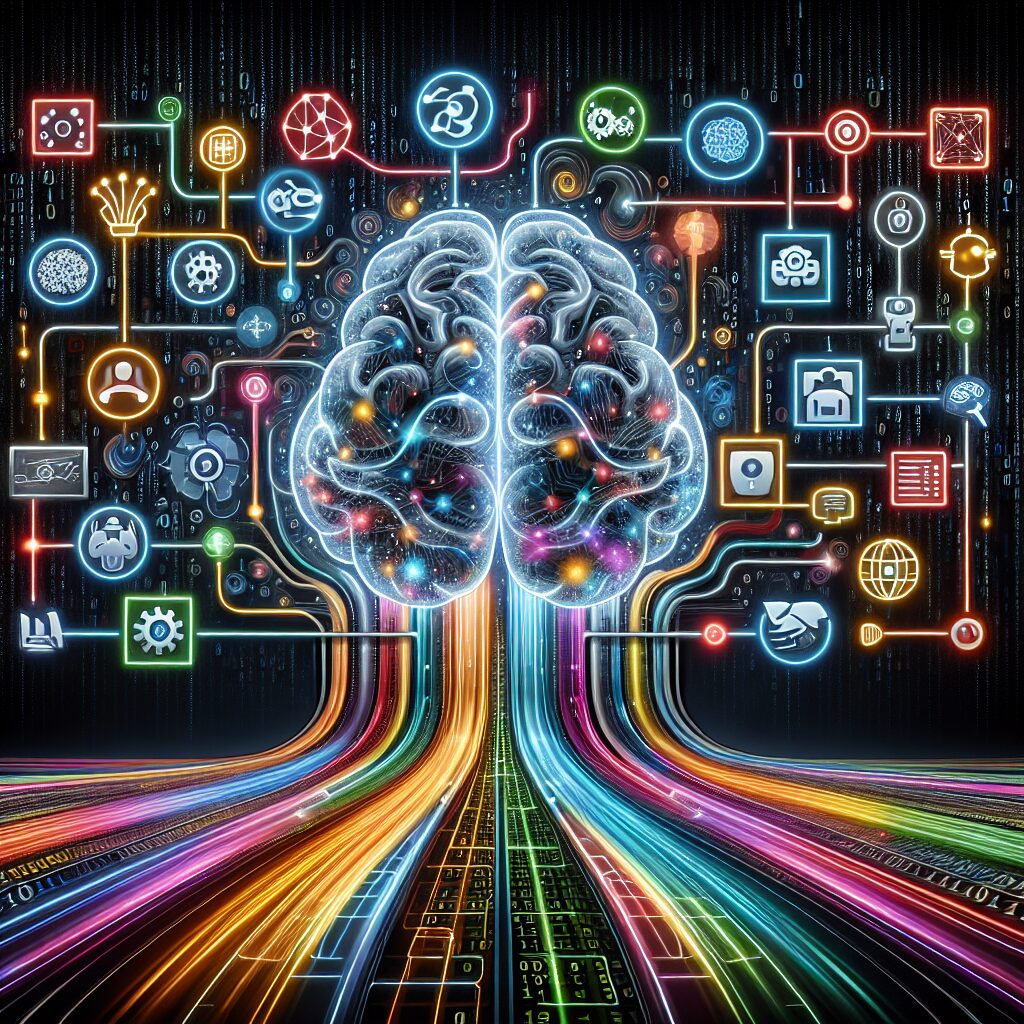AI Tools and Platforms 2025

AI Tools and Platforms
As AI tools and platforms continue to evolve, the solutions available for personalization are becoming increasingly sophisticated. These AI tools and platforms leverage machine learning algorithms to analyze vast amounts of data, enabling them to predict user preferences and deliver content that is tailored to individual needs.
From e-commerce recommendations to personalized learning experiences, AI-driven personalization is transforming how we interact with digital services, making them more intuitive and user-centric than ever before.
Artificial Intelligence (AI) has rapidly transformed from a futuristic concept into an integral part of everyday technology. As businesses and individuals seek to harness the power of AI, a diverse range of AI tools and platforms has emerged, offering solutions across various domains.
This article explores some of the most prominent AI tools and platforms, highlighting their capabilities, applications, and benefits.
Understanding AI Tools and Platforms

AI tools and platforms are designed to analyze vast amounts of data, learning from patterns and user interactions to deliver personalized experiences. These sophisticated systems can tailor content, recommendations, and services to individual preferences, thereby increasing engagement and satisfaction.
By leveraging machine learning algorithms and natural language processing, they can anticipate needs and provide solutions in real-time, transforming how businesses interact with their customers and how users experience the digital world.
AI tools and platforms provide the infrastructure and software necessary to develop, deploy, and manage AI applications. These range from machine learning frameworks and natural language processing APIs to comprehensive AI development environments.
The right AI tools can significantly enhance productivity, streamline workflows, and deliver innovative solutions across industries.
Popular AI Tools and Platforms
1. TensorFlow
Developed by the Google Brain team, TensorFlow is an open-source library that has become synonymous with machine learning and artificial intelligence. Its flexibility and extensive community support enable developers to easily build and deploy AI models that can scale from small to complex applications.
With TensorFlow, personalization algorithms can be refined to deliver more accurate and contextually relevant experiences to users, making it a cornerstone technology for businesses looking to leverage AI for customized user interactions.
Developed by Google Brain, TensorFlow is an open-source machine learning framework that allows developers to build and train machine learning models. It is highly versatile, supporting deep learning, neural networks, and reinforcement learning.
TensorFlow’s extensive library and community support make it a preferred choice for both beginners and experienced practitioners.
2. PyTorch
PyTorch, developed by Facebook’s AI Research lab, is another open-source machine learning library that has gained popularity for its ease of use and dynamic computational graph.
It enables developers to perform computations on tensors with automatic differentiation, which is particularly useful for applications involving complex neural networks.
The intuitive design and straightforward debugging process of PyTorch appeal to researchers and developers who prioritize flexibility and speed in their AI personalization projects.
An open-source machine learning library created by Facebook’s AI Research lab, PyTorch is known for its dynamic computational graph and ease of use. It is particularly popular in the research community for its flexibility and seamless integration with Python. PyTorch excels in applications involving computer vision and natural language processing.
3. IBM Watson
IBM Watson stands out in the realm of AI personalization with its advanced data analytics and natural language processing capabilities. It enables businesses to tailor their services to individual customer preferences, learning and adapting over time to deliver increasingly relevant and personalized experiences.
By leveraging Watson’s sophisticated algorithms, companies can analyze vast amounts of data to predict customer behavior and make real-time decisions that enhance user engagement and satisfaction.
IBM Watson is a suite of enterprise-ready AI services, applications, and tools. It offers capabilities in language processing, machine learning, and computer vision. Watson is widely used in industries such as healthcare, finance, and customer service to automate processes and gain insights from data.
4. Amazon SageMaker
Amazon SageMaker is a fully managed service that provides developers and data scientists with the ability to build, train, and deploy machine learning models quickly.
SageMaker removes the heavy lifting from each step of the machine learning process, making it easier to develop high-quality models with a broad set of algorithms and frameworks at your disposal.
This service is integral for businesses looking to scale their machine learning capabilities without the complexities traditionally involved in model development and tuning.
Amazon SageMaker is a fully-managed service that provides every developer and data scientist with the ability to build, train, and deploy machine learning models quickly. It offers a range of tools to automate machine learning workflows, making it easier to scale and manage large-scale machine learning projects.
5. Microsoft Azure AI
Microsoft Azure AI stands as a robust suite of cloud services that cater to various AI needs, including machine learning, knowledge mining, and AI apps and agents.
With its comprehensive set of AI tools and services, developers can easily infuse AI into their applications, enhancing them with the ability to see, hear, speak, understand, and interpret human needs through natural methods of communication.
Furthermore, Azure AI’s scalable and trusted platform ensures that AI solutions can be deployed securely and efficiently, with compliance to industry standards, thereby empowering businesses to innovate and stay competitive in the rapidly evolving digital landscape.
Azure AI is a set of AI services offered by Microsoft that includes pre-built APIs for vision, speech, language, and decision-making tasks. Azure AI is designed to integrate seamlessly with existing Microsoft services, providing a comprehensive platform for building AI applications in the cloud.
Applications of AI Tools and Platforms

AI Tools and Platforms
The versatility of AI tools and platforms is evident in the myriad of applications they enable, ranging from personalized customer experiences to advanced analytics and predictive models.
By leveraging machine learning algorithms, businesses can tailor their services and products to individual user preferences, enhancing satisfaction and loyalty.
Furthermore, these intelligent systems have the capacity to process and interpret vast amounts of data in real-time, providing insights that drive strategic decision-making and create competitive advantages in various industries.
AI tools and platforms are used across various sectors to improve efficiency, enhance decision-making, and create innovative products. Some key applications include:
1: Healthcare: In healthcare, AI personalization plays a pivotal role in tailoring patient care to individual needs. By analyzing vast amounts of medical data, AI systems can predict health outcomes, suggest personalized treatment plans, and even assist in early diagnosis of diseases.
This level of customization not only improves patient outcomes but also streamlines the workload of healthcare professionals by providing them with actionable insights derived from complex data patterns that would otherwise be impossible to discern with human analysis alone. AI is used for predictive analytics, drug discovery, patient diagnosis, and personalized medicine.
2: Finance: In the finance sector, AI personalization is revolutionizing the way consumers interact with their financial institutions. By leveraging machine learning algorithms, banks and fintech companies are able to offer personalized financial advice, predict individual customer needs, and provide tailored investment strategies.
This not only enhances customer satisfaction by delivering a more bespoke banking experience but also increases efficiency by automating routine tasks and improving decision-making processes with predictive analytics. AI tools help in fraud detection, risk management, algorithmic trading, and customer service automation.
3: Retail: In the realm of retail, AI personalization has revolutionized the shopping experience for consumers. By analyzing shopping patterns, purchase history, and browsing behavior, AI systems can provide tailored product recommendations and personalized discounts that significantly enhance customer engagement.
Moreover, these intelligent systems streamline inventory management and optimize supply chains, ensuring that retailers can anticipate demand and reduce waste.
As a result, both customer satisfaction and operational efficiency are elevated, creating a seamless bridge between physical and digital commerce. AI enables personalized recommendations, inventory management, and chatbot services for enhanced customer engagement.
4: Manufacturing: In the realm of manufacturing, AI personalization takes on a transformative role, streamlining production lines and tailoring manufacturing processes to individual specifications with unprecedented precision.
By leveraging machine learning algorithms, manufacturers can predict maintenance needs and optimize machine time, reducing downtime and increasing productivity.
Furthermore, AI-driven customization facilitates the creation of bespoke products, satisfying the growing consumer demand for unique, personalized items without sacrificing the economies of scale typically associated with mass production. AI is applied in predictive maintenance, quality control, and supply chain optimization.
Benefits of Using AI Tools and Platforms
1: Increased Efficiency: AI-driven personalization tools enable businesses to analyze vast amounts of data in real-time, allowing for the rapid identification of consumer trends and preferences.
This heightened understanding of customer behavior leads to the creation of more targeted and relevant products and services, which in turn can significantly enhance customer satisfaction and loyalty.
Moreover, AI personalization can automate and streamline complex decision-making processes, reducing the time and resources required to bring customized offerings to market. Automating routine tasks allows businesses to focus on strategic initiatives.
2: Enhanced Decision-Making: By leveraging vast amounts of data and sophisticated algorithms, AI personalization empowers organizations to make more informed and nuanced decisions. It can predict customer preferences and behaviors with remarkable accuracy, enabling businesses to tailor their strategies in real-time.
This enhanced decision-making capability not only improves customer experiences but also optimizes operational efficiency, leading to a competitive edge in an increasingly data-driven market. AI provides insights from data that can inform better business decisions.
3: Cost Savings: By automating routine tasks and personalizing customer interactions, AI-driven personalization helps businesses reduce labor costs and minimize human error.
The technology enables companies to allocate their resources more effectively, ensuring that human talent is focused on more strategic, creative tasks that require a personal touch.
Moreover, the predictive capabilities of AI can lead to reduced waste and more efficient inventory management, further driving down costs and enhancing profitability. Reducing manual labor and optimizing operations can lead to significant cost reductions.
4: Innovation: Enhanced Customer Experiences: AI personalization extends beyond just efficiency and cost-savings—it plays a pivotal role in elevating customer experiences.
By analyzing individual user data, AI can tailor recommendations, content, and interactions to match each customer’s preferences and behaviors. This level of customization fosters a deeper connection between the brand and its consumers, leading to increased loyalty and satisfaction.
As AI continues to learn and adapt to user feedback, the potential for creating truly unique and memorable customer journeys is virtually limitless. AI enables the development of new products and services that were previously not possible.
Conclusion
AI tools and platforms are reshaping the technological landscape, offering unprecedented opportunities for innovation and efficiency across industries. As businesses continue to harness the power of AI personalization, they are finding that the benefits extend far beyond increased engagement and conversion rates.
By tailoring experiences to individual preferences and behaviors, companies are cultivating deeper loyalty and customer satisfaction, which are critical in today’s competitive market.
Furthermore, the insights gleaned from AI-driven data analysis are empowering organizations to make more informed strategic decisions, optimize their operations, and predict future trends with greater accuracy.
As these tools continue to evolve, they will undoubtedly play an increasingly vital role in driving the future of technology. Whether you are a developer, data scientist, or business leader, understanding and leveraging these AI solutions is essential for staying competitive in today’s digital world.



